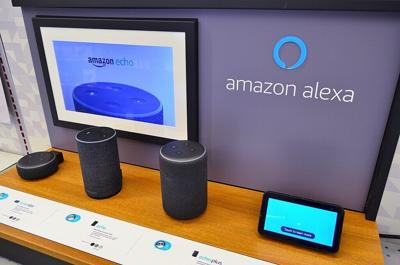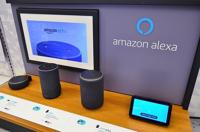
CHICAGO - A federal judge has greenlit a class action alleging Amazon’s Alexa devices violated an Illinois privacy law through unauthorized voice recordings.
U.S. District Judge Franklin Valderrama’s Nov. 19 opinion is the latest ruling in litigation that dates to June 2019 when attorneys with the firms of Taxman Pollock Murray & Bekkerman, of Chicago, and KamberLaw, of Chicago and Denver, filed a complaint in Cook County Circuit Court.
The original lawsuit alleged Alexa devices start recording when a user poses a question and “keeps a recording of the user speaking those words, as well as any follow-up statements or questions, and the statements of any other persons who just so happen to be within recording distance of the Alex device.”
The complaint claimed this recording practice violates the Illinois Biometric Information Privacy Act, which forbids the “collection, retention, capture or purchase of biometric identifiers,” including people’s speech and speech patterns, or their “voiceprint.” The case was quickly removed to federal court, preceding additional plaintiffs and amended complaints filed in 2021 and 2023.
In the current ruling on Amazon’s motion to dismiss, Valderrama said a potential class could include nearly 1.2 million Amazon Voice ID users “in Illinois for whom Amazon created a voiceprint on or after June 27, 2014.” He also noted BIPA’s penalties of $1,000 per negligent violation and $5,000 for a violation deemed reckless or intentional.
Amazon argued class certification would be improper because the claims of those potential Illinois residents would be subject to unique defenses, including ratification, waiver and estoppel, among others. The plaintiffs countered by saying Amazon couldn’t use such common law defenses because BIPA is a strict liability law, cutting off an affirmative defense that focuses not on disproving allegations but the justification for avoiding liability.
Among Amazon’s specific arguments were that two named plaintiffs enrolled in Voice ID in 2022, several years after the initial complaint. But the plaintiffs said the same timeline could apply to many other class members. They further noted Amazon didn’t respond to discovery until December that year, meaning they didn’t, as Amazon alleged, have “full knowledge of all the facts” when enrolling.
Valderrama noted Amazon’s September 2019 motion to dismiss the first complaint discussed how the company creates voice profiles and made it clear enrolling in Voice ID required voiceprint creation. He said one original named plaintiff, Michael Gunderson, is an inadequate class representative because he enrolled in Voice ID years after Amazon’s declaration.
But another, Christopher Block, wasn’t a named plaintiff when he enrolled.
The judge noted Block was involved with KamberLaw as local counsel for several Americans with Disabilities Act lawsuits in 2019. But Valderrama said Block didn’t communicate with anyone from the firm about the Amazon lawsuit until the spring of 2023, which the judge said undercuts concerns he is more concerned with supporting the firm than the class.
Amazon also challenged the viability of plaintiff Jason Stebbins, saying most potential class members would not have struggled with understanding that the words “conditions of use” in blue text were a hyperlink to the type of information that would’ve better informed his decisions regarding Voice ID. Amazon further provided a recording of Stebbins saying “Alexa I want to teach you my voice.”
And while Valderrama agreed Stebbins could have a credibility problem, he said neither that nor his understanding of the hyperlink were likely to harm the class’ chances of successful litigation.
Whether the named plaintiffs had knowledge of Amazon’s disclosures when they enrolled in Voice ID is a question for summary judgment, Valderrama said, and not appropriate at the certification stage. He also said the fact the plaintiffs haven’t deleted Voice ID doesn’t place them at odds with potential class members.
Valderrama also said it’s too early “to engage in a merit-based analysis” of whether Voice ID created the type of identifiers that fall under BIPA protections. He noted the plaintiffs adequately alleged all Illinois users had functionally the same experience when enrolling in Voice ID and “whether Amazon collected, captured or received through trade, or otherwise obtained biometric identifiers or information is a common question that predominates over any individual inquiries.”
He further said that although Amazon pointed to its policy of not selling or sharing customers’ voice information, the question of whether it did so is not relevant to whether the evidence backing the plaintiffs’ claim would be the same across all class members.
Although Valderrama agreed with Amazon that BIPA can’t apply to people who enrolled in VoiceID outside of Illinois, he also agreed the plaintiffs sufficiently alleged the company’s own technology can show where users were physically located at the time they enrolled, effectively giving the company the power to show who should be excluded from the class.
Finally, Valderrama said “no individual analysis is required for determining damages” should the plaintiffs prevail and agreed a class action would be the most efficient way to resolve the underlying claims. He certified the class as requested and said Block and Stebbins — but not Gunderson — are proper representatives.
Amazon is represented in the action by attorney Elizabeth B. Herrington and others with the firm of Morgan Lewis & Bockius, of Chicago and Los Angeles.
The plaintiffs are represented by attorney Michael Aschenbrener and others with the firms of KamberLaw; Taxman Pollock Murray & Bekkerman; Bartimus Frickleton Robertson Rader, of Leawood, Kansas; Goldenberg Heller & Antognoli, of Edwardsville, Illinois; and Peiffer Wolf Carr Kane & Conway, of St. Louis.






